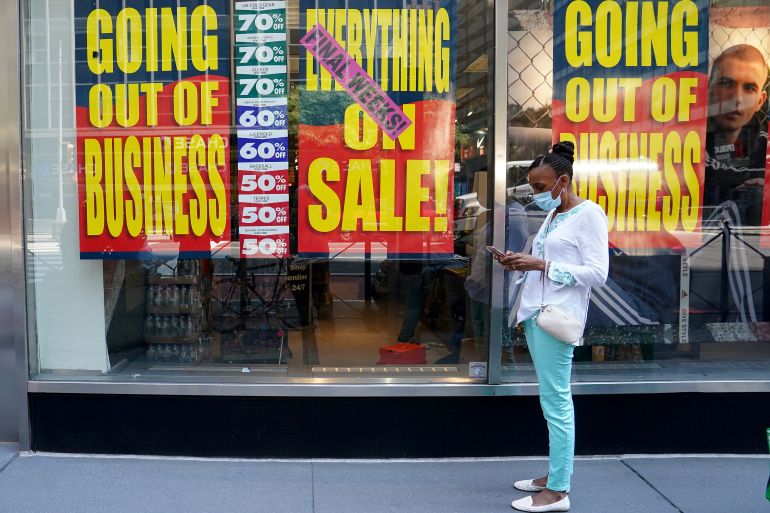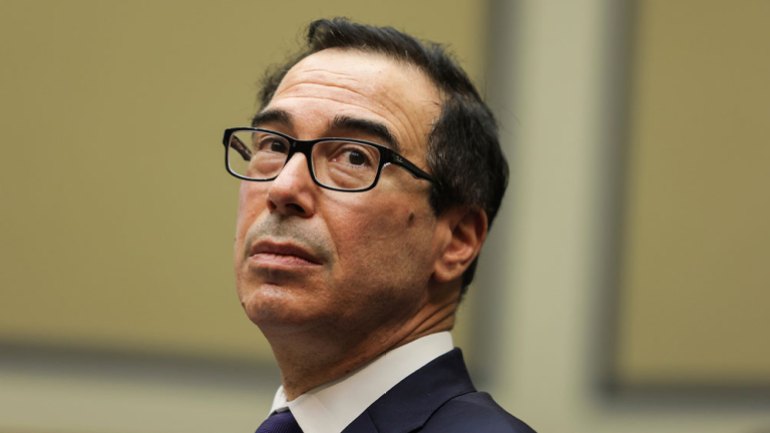Mnuchin won’t extend some Fed COVID-19 emergency loan programmes
End of Main Street and municipal credit lending programmes raises concerns for future stimulus under Joe Biden.

Treasury Secretary Steven Mnuchin said Thursday he will not to extend several emergency loan programmes set up with the Federal Reserve to support the economy in the midst of the coronavirus pandemic.
The decision drew a terse rebuke from the Fed.
Keep reading
list of 3 itemsCOVID-19 vaccine eclipses US elections as economy game-changer
Biden urges ‘immediate relief’ for economy as COVID surges
The central bank said it “would prefer that the full suite of emergency facilities established during the coronavirus pandemic continue to serve their important role as a backstop for our still-strained and vulnerable economy”.
But in a letter to Fed Chairman Jerome Powell, Mnuchin said that the Fed’s corporate credit, municipal lending and Main Street Lending programmes would not be renewed when they expire on December 31.
By law, the loan facilities required the support of the Treasury Department, which serves as a backstop for the initial losses the programmes might incur.
Mnuchin said that he was requesting that the Fed return to Treasury the unused funds appropriated by Congress for the operation of the programmes.
He said this would allow Congress to re-appropriate $455bn to other coronavirus programmes. Republicans and Democrats have been deadlocked for months on approval of another round of coronavirus support measures.
In public remarks Tuesday, Powell made clear that he hoped that the loan programmes would remain in effect for the foreseeable future.

“When the right time comes, and I don’t think that time is yet, or very soon, we’ll put those tools away,” he said in an online discussion with a San Francisco-based business group.
The future of the Main Street and Municipal Lending programmes has taken on greater importance with President-Elect Joe Biden’s victory.
Progressive economists have argued that a Democratic-led Treasury could support the Fed taking on more risk and making more loans to small and mid-sized businesses and cash-strapped cities under these programmes.
That would provide at least one avenue for the Biden administration to provide stimulus without going through Congress.
Neither programme has lived up to its potential so far, with the Municipal Lending programme making just one loan, while the Main Street programme has made loans totalling about $4bn to about 400 companies.
Mnuchin’s move came as the virus has surged and consumer spending slowed, as well as colder weather that will shut down outdoor dining, which will cause more small and mid-sized businesses to struggle with lower revenue and potentially close.
However, Republican Senator Pat Toomey of Pennsylvania said in a statement that he approved of Mnuchin’s decision.
“Congress’ intent was clear: These facilities were to be temporary, to provide liquidity and to cease operations by the end of 2020,” Toomey, a member of the Senate Finance Committee, said. “With liquidity restored, they should expire, as Congress intended and the law requires, by December 31, 2020.”
The coronavirus has infected more than 11,689,000 people and killed 252,290, according to the Johns Hopkins University tally.